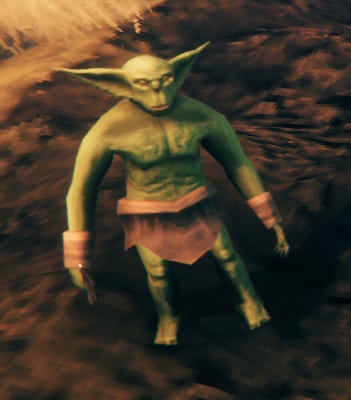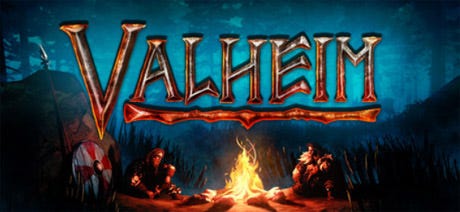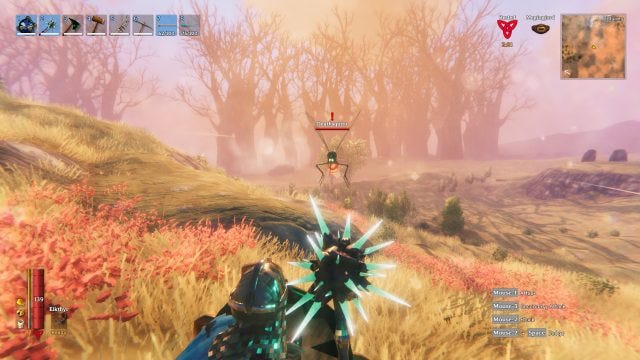Design Deep Dive: Valheim
Finding the exact right way to annoy the player.
I love to go into design deep dives of indie games. Not enough game criticism delves into the delicate workings of games. It's important to ask the questions: What in this game works? What doesn't? What good things about this game can other developers use to improve their work? What pitfalls should be avoided?
So I'm going to talk about my recent addiction, Valheim. It is a phenomenally successful indie title. It is in Steam Early Access and seems to be about half done. It sold over 7 million copies by this writing, which puts most AAA titles to shame. I've finished all the available content. More is on the way. Let's talk about it!
What Is Valheim?
So. Valheim. It's a survival game. You're a Viking. You punch trees to get wood. You pick up rocks. Then you make crude tools and weapons. Then you kill 5 bosses. (For now.)
Each boss you kill give you access to better technology, which lets you get better tools and armor and weapons. Eventually, instead of punching trees to get wood, you punch megatrees to get megawood.
There is also an extensive building system, which you can use to make giant wood or stone Viking halls. Depending on how much you care, you can spend between one and infinity hours on this.
And finally, this game is hardcore and unfair. Monsters will wander from the hard areas into the easy areas and murderate you. Death gives you punishing penalties. You also will need to get back to your corpse to get your stuff back. If you're careless or exploring in your boat, this can be VERY difficult.
Since the game is Early Access, there is little in the way of tutorials or helpful information. Expect to, in the best Minecraft/Dark Souls fashion, have to do research online to figure out how things work. This is a feature, not a bug. It turns players of the game into a community. I think this is one of the most unexpected, interesting elements of modern game development.
There is also extensive multiplayer. You can also play in your world with 10 people, which is an awesome thing I didn't do. I need better (or worse) friends.
A Few Quick Good Things Out of the Way
Valheim is, even in its early state, loaded with stuff to do. There are 6 different terrains to explore (counting ocean), all of which play very differently. There is a really satisfying sailing system, complicated enough to feel real but not complicated enough to be annoying.
There is building. And fishing. And hunting sea serpents. And fort raids. And dungeons. Whenever one game element gets old, there's always something new to do.
The food/health system is really clever. Your base maximum health never goes up. Instead, your health depends on the food you just ate. The better the food, the more health you temporarily have. A lot of the game is getting more nourishing food. Then you get hungry in the middle of a boss fight, and all your health disappears. Which is hilarious.
OK. Let's dig deeper into what makes games like this work. And what sorts of designs indie developers can do that AAA devs would never touch.
Survival/Building Games, For Sanity
There is no shortage of tree-punching, build-the-imaginary-castle-of-your-dreams survival games. Minecraft. Ark. Don't Starve. Raft. Subnautica.
Each has its own tech tree, building system, and punishment for missteps. But they're all kind of the same. You always need to make an axe, but it might be a water axe or a laser axe. They have different skins, but they all sell the same product.
Video games are art, and each work of art is made to have an effect on your brain. Survival games make, in your brain, a feeling of satisfaction and achievement. They create the illusion that you have built something. Something big and impressive. Something that will even survive after you are gone.
This is a very precious thing. After all, it's 2021. Huge numbers of us don't work. Most of those who do work don't do anything meaningful. For so many of us, the secrets of how to actually build something in real reality died with our grandparents.
Building a house in Valheim or whatever is the closest I will ever come to standing in the doorway of the home I built, slapping the wall with my hand, and saying, "I MADE this."
This is doubly important in the Rona-time. Pretending to explore the outdoors and build a castle is a great way to numb your growing awareness that you are never going outside again.
The Importance of Limits
The satisfaction of creation is a powerful feeling, and Valheim is very good at eliciting it. It's a delicate business to create that feeling in a brain. Your job has to be hard enough to feel like you are doing something, but not so hard as to be frustrating. Realistic enough that your brain can believe it, but not realistic enough that it becomes actual learning.
Valheim creates the feeling that you are part of an epic tale, taming a wild land for your people. To make this work, the game has to push back at you and make it feel epic. Which leads to ...

Valheim's Most Important Design Decision
OK. There are five bosses. Each boss gives you access to a new sort of metal ore. Ore has to be processed into bars. Metal bars are really important. They are how you get the new weapons and armor and tools you need to survive.
But the world is HUGE. To get to the metal, you usually need to take a long journey. You can make magical portals, which let you teleport around the world instantly. To make a portal to a place, you have to travel there first. This convenience is necessary to make the game playable, because traveling is dangerous and takes a while.
OK. Now here is the key design decision:
You can't take ore and metal bars through teleporters.
This means: If you want the precious metal, you have to travel to where it is the hard way. You have to mine it. And you have to carry it back to your home base the hard way. (And it is heavy, so you'll need to build carts or ships to carry it.)
Want to make a big new settlement? You'll need metal bars to make the tools you need. Which means you have to haul them to your new home, using delicate and awkward vehicles.
This is a controversial decision. It makes the game a lot harder and take a lot longer to play. Lots of people are demanding that this be changed.
It will not be changed. Because this is what gives Valheim its epic quality. If you want the good weapons, you have to go on an epic journey. If you want to build a new fort, you have to go on an epic journey.
Remember, to evaluate anything in this game, you have to understand the product it is selling: The illusion of accomplishment. For this illusion to work, accomplishments can't be free. They have to have a cost, either in skill or in time.
And that cost has to make sense. You can't just make the player memorize numbers or some other meaningless task. It has to make sense, or your brain will reject it.
If you could teleport metal, the game would have to slow you down in another way. I think the need to carry metal manually is a great way to exact a cost. It makes you think about travel and trade routes and what sorts of terrain are hard to travel through. You have to engage with the shape of the world in a way that makes it more real.
Fairness is Overrated
Nothing ruins a good game design faster than game designers.
Modern game design is about perfect balance and fairness and smoothing off rough edges. Everything in, say, World of Warcraft or Dungeons & Dragons has been balanced and rebalanced and simplified until the game is a perfectly smooth orb.
Every new treasure is a perfectly mathematically generated incremental improvement over the previous treasure. Every monster is perfectly fair and every encounter is precisely designed to give an exactly predictable quantity of challenge.
Being indie frees you from the need to be fair. I still think Minecraft's Creeper is the best monster design in all of video games. It's cute and terrifying and deadly and destroys your accomplishments. Creepers add true unpredictability to the game, the sort of chaos that a mega-budget AAA game can't afford to allow.
Valheim can be infuriatingly unfair. As mentioned before, sometimes deadly monsters will wander out of high-difficulty areas and murder you. Each region has monsters that can instantly destroy you when you first explore it. Several unfair deaths are guaranteed.
If this turns you off from playing the game, that's OK. You just aren't buying the product it is selling.
But if you are in it so your brain can get that sweet Accomplished Something hit, the unfairness is a feature. Then, when you inevitably do achieve your goal, the satisfaction is all the sweeter, knowing that even the game being unfair couldn't stop you.
The Danger of Difficulty Fetishists
There is a key problem with designing a really hard game: It can be very difficult to tell when something is too hard.
This is especially difficult when you listen to fan feedback, because you will get a lot of difficulty fetishists. There are some players who will only ever tell you to make a game harder. When someone else complains about anything, no matter how reasonable the complaint, the difficulty fetishists will swarm them and call them names. It's kind of an ugly social dynamic.
How do you tell what is just-right unfair, and what is too unfair?
Fortunately, there is a way out of this puzzle: Don't forget what sort of product you are selling.
Valheim sells the feeling of accomplishment. It's ok for there to be obstacles, as long as they add to the feeling of accomplishment.
What this means is that it's all right for the game to be mean. To be confusing. To be unfair. The only thing the game is not allowed to do is be repetitive. Bland. Predictable. BORING.
So here is my constructive criticism: The world of Valheim is very large, and it can take a lot of searching to find the later bosses. Like, hours of searching, exploring copies of the same terrain and killing copies of the same monsters. This is boring. If it were me, I'd make finding the late bosses way faster. Believe me, Valheim is long enough as it is.

The Future of Valheim
Valheim is a huge hit. It's doing AAA numbers.
Some people are worried that this will slow down Valheim's development. And it will. This sort of success must be dealt with. You have to build support systems. Hire new people. Make a thousand changes to your business. This takes a lot of time.
But don't worry. I have no doubt that the game will be finished, and it will be good. Valheim is clearly a labor of love. Its developers will finish it. That’s what we do with our lives?
This Is Why We Have Indie Games
When you play a good indie game, you can sense the creators. You can feel that it is a work made by human beings, who are trying to make something personal, something they love.
When you play one of my games, love it or hate it, you can feel it came out of one person's weird brain. You may not like the thing I am saying to you, but you know that it came from me.
Valheim feels personal. More importantly, all the quirky decisions they made dovetail together and work. I spent too many hours in it, I enjoyed them a lot, and I'm looking forward to seeing more. But if you try it and get murdered by a random mosquito? Don't blame me. Just get mad. Then prevail.
Get our intermittent blog posts for free by subscribing here …



"Building a house in Valheim or whatever is the closest I will ever come to standing in the doorway of the home I built, slapping the wall with my hand, and saying, "I MADE this."
Lol, says the man who creates worlds daily. The gods are humble. :)
Slightly off-topic: what the heck is so great about teleporting, that it *has* to be added to each and every modern game? To me it feels like such a contrived and cataclysmic solution to a simple design problem. Travel is boring and takes too long? Obvious answer: make distances shorter and add interesting stuff en route. Preferred answer: remove travel from game. Why?!